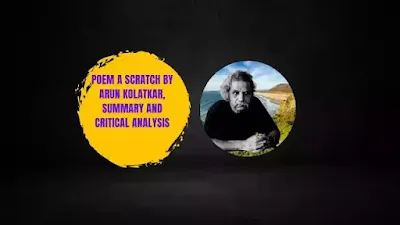Summary of the Poem:
It is very difficult to decide at Jejuri what is a god and what is a stone (because any stone there may turn out to be a god). The dividing line between a god and a stone at Jejuri is very difficult to determine because any stone may prove to be a holy stone personifying some god. In fact, any stone, which a pilgrim picks up, may prove to be the image of a god; and the next stone, which he picks up, may turn out to be a cousin of the god represented by the first stone. A god's cousin is as holy as the god himself; and, therefore, every stone deserves worship.

At Jejuri the only crop grown and reaped consists of gods. In other words, anybody walking over the rocky area around the temple of Khandoba would find that every stone, which he picks up at any time of the day or the night, is regarded by the pious people as the image of some god. A pilgrim may pick up a stone from the dirty, loose earth or he may pick up a stone from the hard rock; but, whatever the case, he would find the stone to be a sacred stone and a personification of some god.
There is one huge portion of a rock, of the size of a bedroom. This portion of the rock is Khandoba's wife who had been turned into a stone figure by Khandoba when he had struck her down with his sword in his fit of fury. The crack, which runs across that portion of the rock, is the scar of the wound which the wife had received from her husband's sword which had a broad blade. Thus a very important event in the life of Khandoba and in the life of his wife has been imprinted on this portion of the rock. The rock bears witness to Khandoba's murder of his wife in a fit of anger.
The fact is that every rock and every stone at Jejuri has some holy and instructive legend connected with it.
Critical Analysis of the Poem:
Here we have another satirical poem. Kolatkar here ridicules the blind faith of the Maharashtrian pilgrims who visit Jejuri to offer worship to Khandoba (who is believed to be an incarnation of god Siva). According to one of the legends connected with Khandoba, he had, in a fit of rage, put his wife to death with a stroke of his sword. The Maharashtrian pilgrims find that incident in the lives of Khandoba and his wife imprinted on a rock. These pilgrims can show you that rock. Khandoba's wife had been turned into a piece of rock when she was murdered; and the crack running across that rock represents the scar which was left by the wound which she had received from her husband's sword.
Kolatkar has ridiculed the blind faith of the pilgrims by saying that almost every stone at Jejuri is sacred because it is an image of some god. Irony is once again the weapon which Kolatkar has employed here to mock at the blind faith of the people. Most amusing is the middle stanza in which the poet says that there is no crop other than gods at Jejuri, and that gods are the harvest which is reaped at this place throughout the year, both during the day and the night. There is thus no limit to the number of stone images of the gods whom the pilgrims can worship. A Scratch is one of the most amusing poems, indeed.






